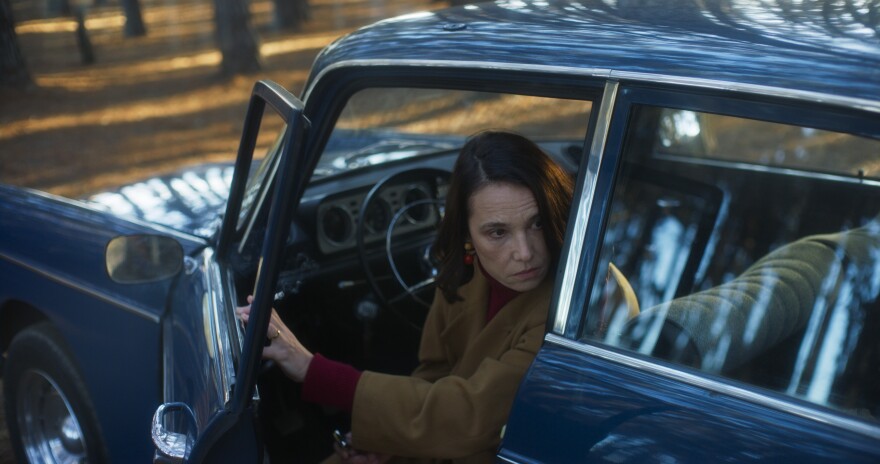The new political thriller Chile ’76 from Manuela Martelli is about life under the rule of the Chilean dictator Augusto Pinochet. The movie is quiet — and for that reason, unnerving.
Chile ’76 feels uneasy from the start. Low electronic rumbles and beats make you wonder about what you don’t know and what might be around the next curve of the movie.
Carmen (Aline Küppenheim) is an upper middle class woman, the wife of a prominent physician, preoccupied with redecorating the family beach home. She wants the exterior to look like pictures of Venice she’s found in a magazine. She watches a painter slowly mix blue into some pink. Soon after, a priest wakens her from a nap to ask her to help a young man who was wounded when he tried to rob a food market. He was starving, the priest tells her – and she’s about to wake up from more than that nap.
Carmen is not a doctor, but she goes to the young man, whose name she later learns is Elias (Nicolás Sepúlveda). After he begins to recover and can talk again, Carmen wonders who he is. She knows he’s no common criminal—and the young man agrees.
As the title suggests, the year is 1976. It’s three years after dictator Augusto Pinochet led a coup to overthrow Chile’s President Salvador Allende. Pinochet established a reign of terror that disappeared thousands of Chileans, their bodies dumped in the ocean or in the vast Atacama Desert. Carmen is from a class of people who do not suffer from Pinochet’s rule. She and her husband are well-connected and protected. She has gone about her life unperturbed—until now.
But the brilliance of Chile ’76 is that it’s not just about one woman who’s life of comfort is upended. The picture also shows how the malice of tyranny seeps into the lives of comfortable people like Carmen, who assume that current events like a dictatorship have nothing to do with them.
When her son starts to complain about the government during a family dinner, the father interrupts to keep the conversation off that subject. But for Carmen, her fundamental decency leads her ever deeper toward an understanding of how Chilean life has been perverted.

When she first meets Elias, Carmen cleans the wound and gets blood on her hands. As things progress, she grows furtive. She lies to get penicillin for Elias, and she must hold this enormous secret from her family. She’s entered, at least partly, the Chilean anti-dictatorship underground. To help get the young man back to his comrades, Carmen winds up taking several buses, walking down a street with a lightbulb in her hand, and learning coded responses to questions. It’s what TV shows, at least, call 'spycraft.' Yet, through it all, she is still the well-mannered proper wife of a respected doctor. After Carmen’s identity papers get stolen, a neighbor connected to the regime gives them back to her with a barbed warning not to lose them again.
In Chile ’76, a corrupt and murderous regime affects everyone. Either a person goes along and accepts the benefits of tyranny, or their sense of morality or kindness forces them to oppose the regime and ultimately join with others.
The genius of Chile ’76 is its understated demeanor. Nothing explodes. Carmen never yells. She doesn’t argue with her husband or show defiance to the neighbor. She’s polite to the officers at a traffic stop while she whispers to herself a “Hail Mary.”
Chile ’76 is a bit like novelist Virginia Woolf’s Mrs. Dalloway – in which a comfortable woman gets ready to host a party that evening, and all is lovely until she sees a maimed World War I veteran on the street. Chile ’76 ends with a birthday party for Carmen’s granddaughter.






